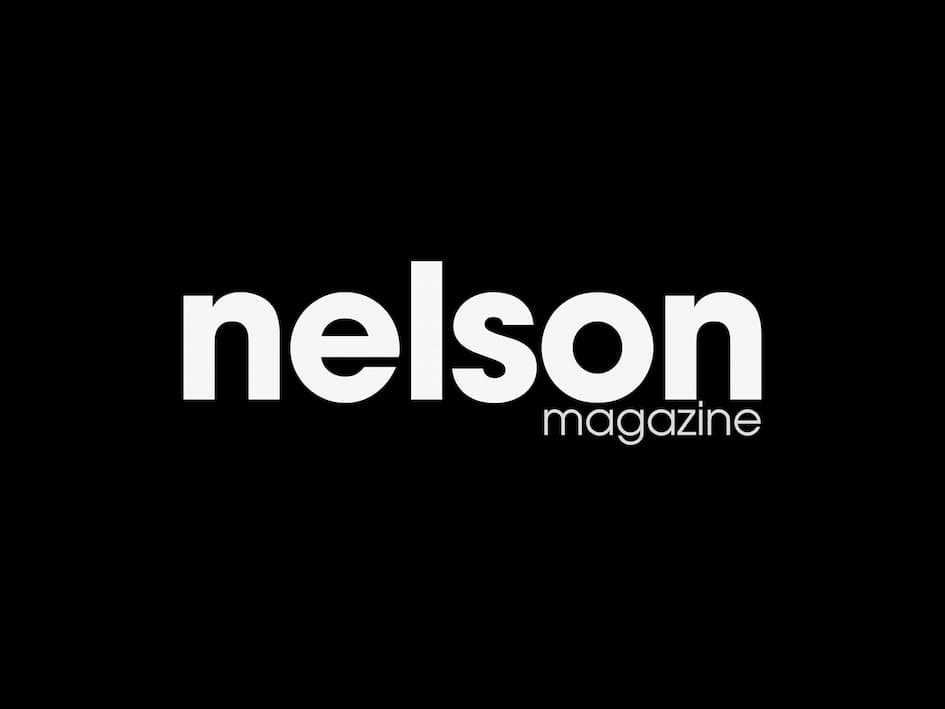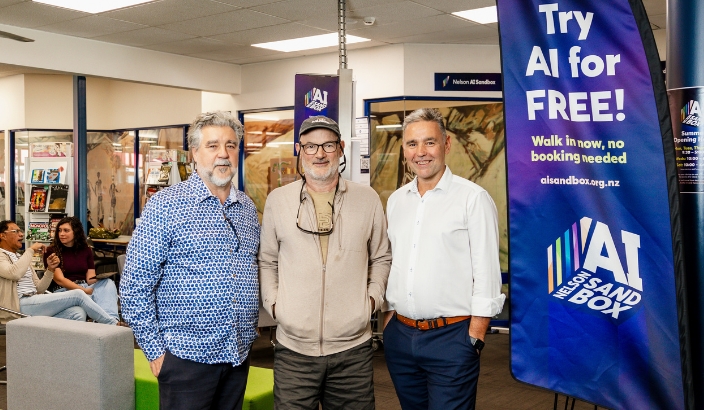AI for all in Nelson


AI Sandbox general manager Richard Brudvik-Lindner with board chair Mark Houghton-Brown and board member Richard Butler.
In a corner of the library a quiet artificial intelligence revolution is taking place. Charles Anderson talks to the founder of Nelson AI Sandbox, who believes the city could become a thriving hub for AI.
Wander into the Elma Turner Library, turn right and sit down at a table. Maybe you have a problem. Maybe you have ordered a cross stitch pattern off the internet but you don’t speak the German that the instructions are in. Maybe you are trying to book a holiday but can’t bring yourself to navigate the myriad tourism sites spouting all kinds of brain numbing deals. Or maybe you have returned from holiday with thousands of photos and want to help organise them into something that makes more sense.
These are all examples of the problems that the Nelson AI Sandbox has helped solve for ordinary Nelsonians. While these might seem like innocuous issues, the vision for the project is much grander. It sees Nelson as an artificial intelligence hub where people across the city, regardless of their background, can thrive in the ever evolving digital age. It elevates the companies that now exist there which are all leveraging AI to create economic growth. Combined, it hopes to create a more equitable city where all can use the transformative power of AI to benefit lives.
And this corner of the library has a part to play in that. It is the brainchild of Richard Brudvik-Lindner. His creation, the Nelson AI Sandbox, stands as a testament to his commitment to democratising artificial intelligence, fostering a community where knowledge and innovation converge.
Richard's journey is a rich tapestry woven from a diverse array of experiences. His background, spanning philosophy, journalism, pivotal roles within technology giants like Microsoft and Sega, and now as a teacher at Nelson College, has provided him with a unique perspective on the power and potential pitfalls of technological advancement.
"I’ve seen how technology can transform industries and societies," he says. "But I've also seen how it can exacerbate existing inequalities. That’s why I believe in democratising access to these tools, ensuring they serve the entire community."
This awareness fuelled his passion for education, particularly his work in teaching social studies.
"I wanted to equip my students with the critical thinking skills to navigate a world increasingly shaped by technology," he explains. "It’s not enough to simply use these tools; we must understand their implications and ensure they serve the greater good."
His approach in the classroom, fostering critical thinking about the societal impacts of AI, laid the groundwork for his future work with the Sandbox.
The seed for the Nelson AI Sandbox was planted with the Whakatū Intellectual Capital Kohanga (WICK), an organisation dedicated to cultivating Nelson’s knowledge economy, especially after the ambitious Nelson library redevelopment was announced. When this project faced delays and then a total rethinking, Richard seized the opportunity to address the burgeoning interest in AI, sparked by the advent of ChatGPT.
"We asked, 'Could we do something as a demonstration project for what a 21st-century library could be?'" he recalls. "Something that would be more than just a building, but a dynamic space for learning and innovation, a true community hub."
The vision shifted from a library space to something else.
"It was always about how can we be of service to the community through this?"

He draws the analogy to the electrification of communities, noting that those who embraced the technology early reaped significant benefits. He envisions AI as the new frontier, a catalyst for building capacity and strengthening Nelson’s social fabric.
"It's kind of like, you know, going back to the time when electricity was moved," he says. "And the communities that sort of latched on to that early were the ones that arrived at some additional prosperity. We want that for Nelson with AI."
The Sandbox emerged as an inviting, unintimidating space, a “living room” for AI exploration. Located in a storefront on Trafalgar St, it aimed to help revitalise Nelson’s CBD, attracting diverse demographics and fostering a vibrant community.
Richard's aspiration to eventually keep the Sandbox open from 11am to 2am, seven days a week, underscores his commitment to creating a hub for the tech-savvy and community builders alike.
"A lot of those guys are night owls, and so, you know, trying to have a space where that community could go and build that community, and interact with each other, and then every time they do that, of course, that also is potentially a building block for the economy."
To bring his vision to life, Richard assembled a team of experts, including Julian Maclaren and Mark Houghton Brown from the Nelson AI Institute, Matthew Kidson, Richard Butler of BlueberryIT, and Gisela Carr. Each contributed unique expertise and resources.
"We really want to strengthen the social fabric," he says. "Build capacity in our community, so AI benefits everyone, not just a select few."
Richard envisions AI as a tool to bridge the digital divide and create a more prosperous and inclusive society.
"Any time you have prosperity, if it's, you know, fairly shared around, somewhat evenly distributed, it becomes a healthier society," he says. "And that strengthens the social fabric. We see AI as a way to create that shared prosperity."
The Sandbox’s initiatives – curated streams, hands-on workshops, public lectures, and tailored familiarisation sessions – are designed to demystify AI and make it accessible to everyone.
"We try to figure out where they're at just in time, in terms of, like, their temperature on AI," Richard says. "And then from there, our point of departure, for most people, is like finding out what's going on in their life."
From helping retirees manage digital photos to assisting local businesses with AI integration, the Sandbox offers personalised guidance, ensuring everyone feels comfortable exploring AI's potential.
The impact of the Sandbox extends beyond individual learning. It has become a catalyst for innovation, fostering a vibrant ecosystem of AI-driven businesses.
Local companies like Teachplus.ai, which is revolutionising educational tools, and VoiceAI NZ, exploring voice-driven AI solutions, are thriving. SnapCORE optimises digital content, while Apply AI streamlines recruitment. AI Factory develops diverse AI tools, and established players like Shuttlerock integrate AI into their global mobile video advertising.
The Nelson AI Institute is a key collaborator, providing crucial expertise and resources. The Sandbox has also created two local startups through its volunteer programme.
Richard’s teaching background has made him acutely aware of the digital divide.
"As a teacher, I see in my classroom all the time the chasm that exists between the haves and the have nots, the technology phobic and the technology friendly," he says.
"And so, you know, trying to lessen that divide and to make everyone feel like they can live in this world in a way that's happy and productive. That's what the Sandbox is about."
He is particularly passionate about the ethical implications of AI.
"AI is a powerful tool, but it's essential that we use it responsibly," he says. "We need to ensure that AI systems are fair, unbiased, and respectful of human rights. We're not just about tech; we're about ethical tech."
He recognises that as AI becomes more integrated into daily life, it's crucial to cultivate a responsible and informed approach to its use. "We're not here to evangelise AI," Richard says. "We know that it has bad uses. We know that there are bad actors out there."
This awareness underscores the Sandbox’s commitment to fostering ethical AI practices within the Nelson community. He understands that the potential for misuse exists, particularly in areas like data privacy, algorithmic bias, and the spread of misinformation. Therefore, the Sandbox actively engages in discussions and workshops that explore these ethical dilemmas, aiming to equip individuals and businesses with the knowledge to navigate them responsibly.

"All we can do is we can try to amplify the good uses," Richard explains. "And that's what we're trying to do through the AI Sandbox, democratising this technology, giving people a sense that it doesn't have to control them. They can control it and then helping them to maximize the good uses of it."
Richard’s vision extends to AI adaptation counselling and coaching sessions, preparing Nelsonians for a future where AI is deeply integrated into daily life.
"How do we help people to adapt to that world?" he asks. "And that might mean some coaching. You try this and that, and so counselling in the non psychological way, but, you know, just right, helping them to think through other ways, to process what's happening in the world."
The Sandbox has faced challenges, including funding constraints, but Richard remains optimistic.
"We’re at an inflection point," he admits, "but we’re determined to find a way to continue. We’ve built something special, and we’re not going to let it fade."
Richard's vision for the Sandbox extends beyond its current operations. He envisions the organisation becoming a long-term resource for Nelson, providing ongoing education, support, and guidance as AI continues to evolve.
"We hope to continue to bridge the digital divide that exists," he says. "And to make everyone feel like they can live in this world in a way that's happy and productive."
Quick facts about AI
• The term ‘Artificial Intelligence’ was first used in 1955 by computer scientist John McCarthy.
• AI helps detect diseases earlier than doctors in some cases, like spotting signs of cancer in scans.
• AI powers everyday things like Netflix recommendations, Google Maps, and even spam filters.
• Most people interact with AI about 20 times a day – often without realizing it.
• AI tools can now write movie scripts, compose music, and even design fashion collections.
Surprising uses for AI
• In conservation, AI listens for endangered animal calls in the wild to help protect species.
• AI-generated models predict earthquakes and tsunamis faster than traditional methods.
• Museums are using AI to digitally restore ancient artworks and lost languages.
• AI can create virtual ‘clones’ of your voice after just a few minutes of recording.
• In sports, AI analyses player movements to fine-tune game strategies and prevent injuries.
Famous AI moments
• In 1997, IBM’s Deep Blue beat world chess champion Garry Kasparov.
• AI-created art has been auctioned for over $400,000 at Christie’s.
• Some movie studios now use AI to de-age actors or even resurrect historical figures on screen.
Fast definitions
• Machine Learning: When computers learn patterns from data instead of being directly programmed.
• Neural Networks: Computer systems modeled after the human brain, great at spotting patterns.
• Deepfake: An AI-created video or audio clip that looks and sounds real but is entirely fake.
